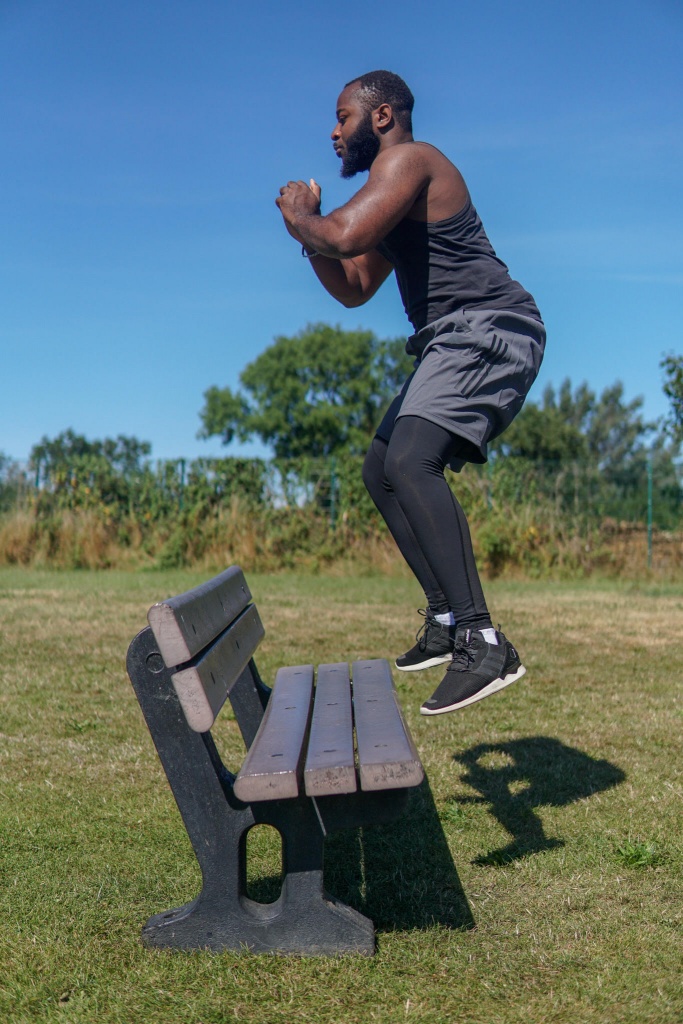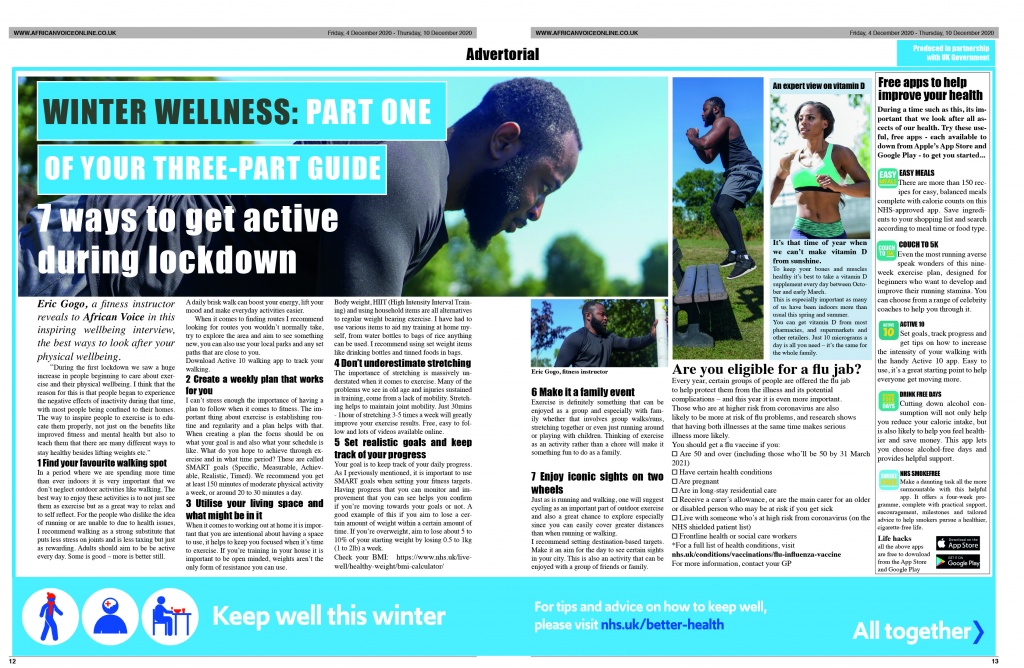WINTER WELLNESS: PART ONE OF YOUR THREE-PART GUIDE

Eric Gogo, a fitness instructor reveals to African Voice in this inspiring wellbeing interview, the best ways to look after your physical wellbeing.
“During the first lockdown we saw a huge increase in people beginning to care about exercise and their physical wellbeing. I think that the reason for this is that people began to experience the negative effects of inactivity during that time, with most people being confined to their homes. The way to inspire people to exercise is to educate them properly, not just on the benefits like improved fitness and mental health but also to teach them that there are many different ways to stay healthy besides lifting weights etc.”
1 Find your favourite walking spot
In a period where we are spending more time than ever indoors it is very important that we don’t neglect outdoor activities like walking. The best way to enjoy these activities is to not just see them as exercise but as a great way to relax and to self reflect. For the people who dislike the idea of running or are unable to due to health issues, I recommend walking as a strong substitute that puts less stress on joints and is less taxing but just as rewarding. Adults should aim to be be active every day. Some is good – more is better still.
A daily brisk walk can boost your energy, lift your mood and make everyday activities easier.
When it comes to finding routes I recommend looking for routes you wouldn’t normally take, try to explore the area and aim to see something new, you can also use your local parks and any set paths that are close to you.
Download Active 10 walking app to track your walking.
2 Create a weekly plan that works for you
I can’t stress enough the importance of having a plan to follow when it comes to fitness. The important thing about exercise is establishing routine and regularity and a plan helps with that. When creating a plan the focus should be on what your goal is and also what your schedule is like. What do you hope to achieve through exercise and in what time period? These are called SMART goals (Specific, Measurable, Achievable, Realistic, Timed). We recommend you get at least 150 minutes of moderate physical activity a week, or around 20 to 30 minutes a day.
3 Utilise your living space and what might be in it
When it comes to working out at home it is important that you are intentional about having a space to use, it helps to keep you focused when it’s time to exercise. If you’re training in your house it is important to be open minded, weights aren’t the only form of resistance you can use.
Body weight, HIIT (High Intensity Interval Training) and using household items are all alternatives to regular weight bearing exercise. I have had to use various items to aid my training at home myself, from water bottles to bags of rice anything can be used. I recommend using set weight items like drinking bottles and tinned foods in bags.
4 Don’t underestimate stretching
The importance of stretching is massively understated when it comes to exercise. Many of the problems we see in old age and injuries sustained in training, come from a lack of mobility. Stretching helps to maintain joint mobility. Just 30mins – 1hour of stretching 3-5 times a week will greatly improve your exercise results. Free, easy to follow and lots of videos available online.
5 Set realistic goals and keep track of your progress
Your goal is to keep track of your daily progress. As I previously mentioned, it is important to use SMART goals when setting your fitness targets. Having progress that you can monitor and improvement that you can see helps you confirm if you’re moving towards your goals or not. A good example of this if you aim to lose a certain amount of weight within a certain amount of time. If you’re overweight, aim to lose about 5 to 10% of your starting weight by losing 0.5 to 1kg (1 to 2lb) a week.
Check your BMI: https://www.nhs.uk/live-well/healthy-weight/bmi-calculator/

6 Make it a family event
Exercise is definitely something that can be enjoyed as a group and especially with family whether that involves group walks/runs, stretching together or even just running around or playing with children. Thinking of exercise as an activity rather than a chore will make it something fun to do as a family.
7 Enjoy iconic sights on two wheels
Just as is running and walking, one will suggest cycling as an important part of outdoor exercise and also a great chance to explore especially since you can easily cover greater distances than when running or walking.
I recommend setting destination-based targets. Make it an aim for the day to see certain sights in your city. This is also an activity that can be enjoyed with a group of friends or family.

Are you eligible for a flu jab?
Every year, certain groups of people are offered the flu jab
to help protect them from the illness and its potential
complications – and this year it is even more important.
Those who are at higher risk from coronavirus are also
likely to be more at risk of flu problems, and research shows
that having both illnesses at the same time makes serious
illness more likely.
You should get a flu vaccine if you:
■ Are 50 and over (including those who’ll be 50 by 31 March 2021)
■ Have certain health conditions
■ Are pregnant
■ Are in long-stay residential care
■ Receive a carer’s allowance, or are the main carer for an older or disabled person who may be at risk if you get sick
■ Live with someone who’s at high risk from coronavirus (on the NHS shielded patient list)
■ Frontline health or social care workers
*For a full list of health conditions, visit
nhs.uk/conditions/vaccinations/flu-influenza-vaccine
For more information, contact your GP
Kindly follow us on twitter:@AfricanVoice2









